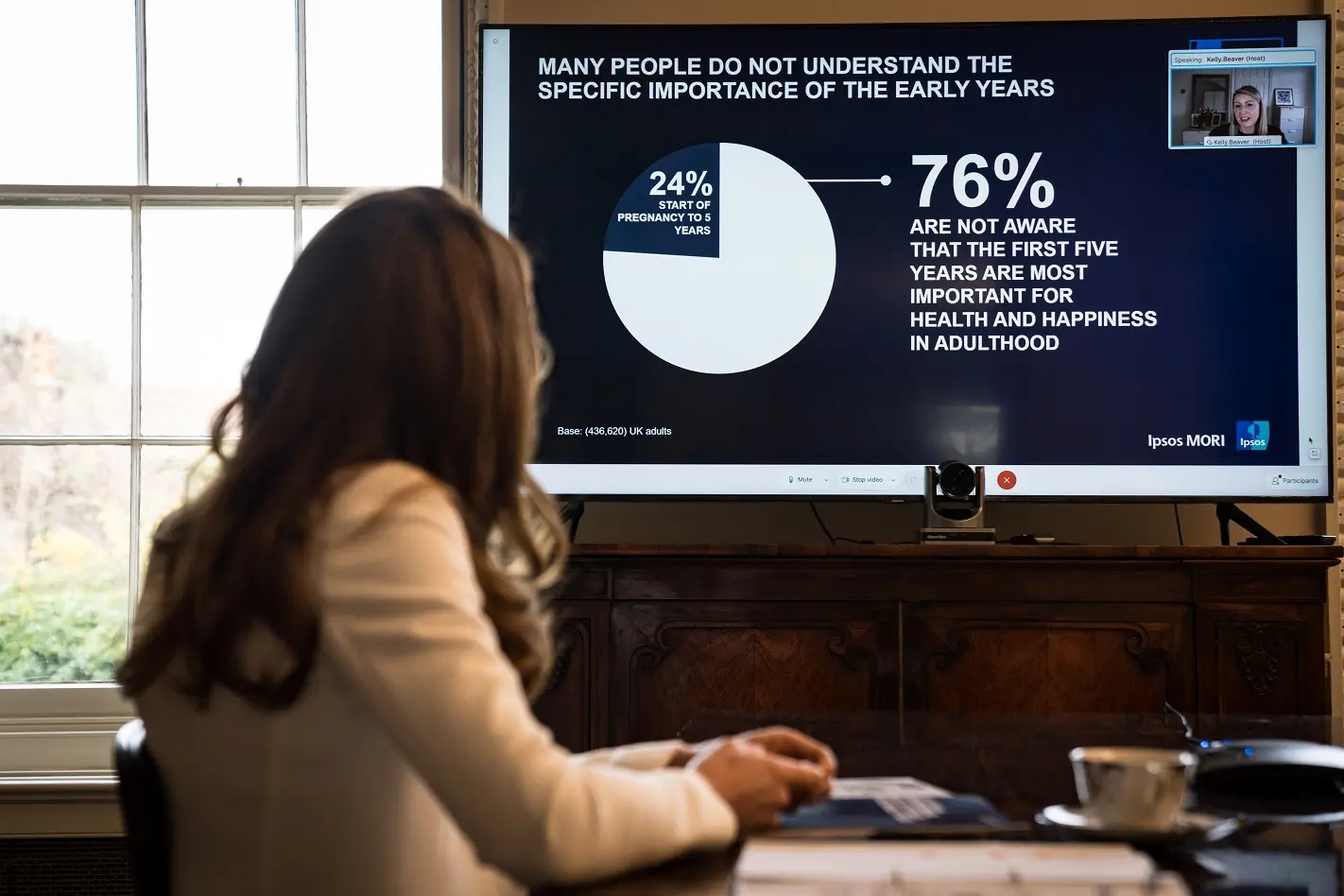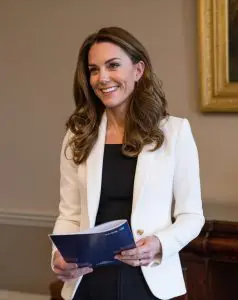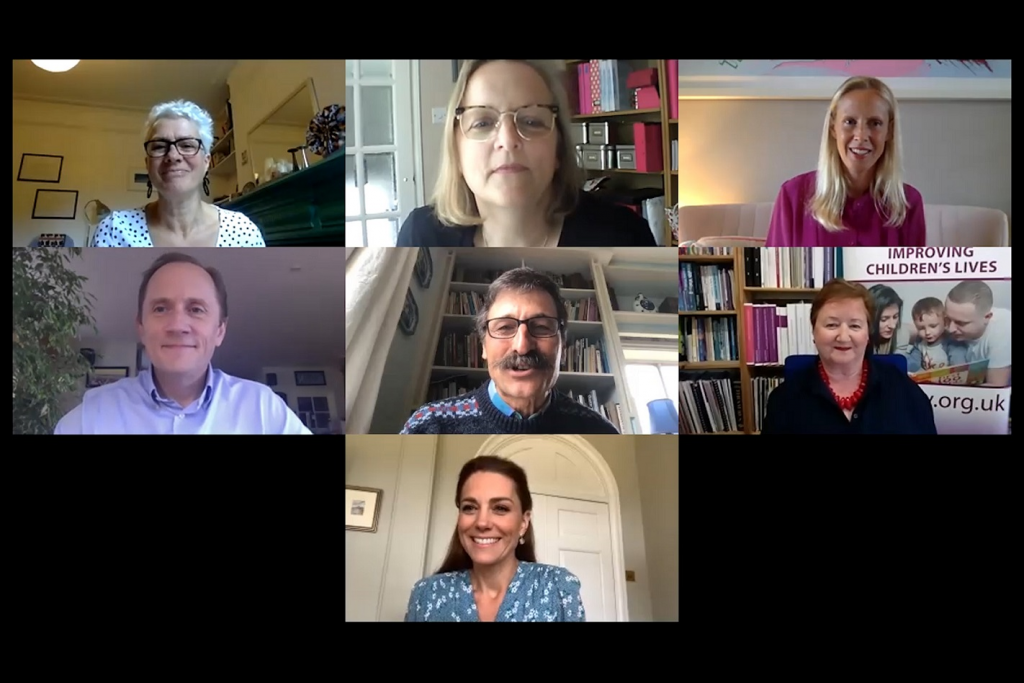Today, The Duchess of Cambridge unveils the findings of the biggest ever UK study on the early years, in a milestone moment for her work on the importance of early childhood in shaping the rest of our lives and broader societal outcomes.
In January, Her Royal Highness asked the general public for their views – sparking a national conversation on the early years through the ‘5 Big Questions on the Under Fives’ survey which attracted over half a million responses, making it the biggest ever survey of its kind.
The research published today includes the findings of the ‘5 Big Questions’ survey as well as further qualitative and ethnographic research, a nationally representative survey conducted before the pandemic and a survey on the impact of COVID-19 on families.

Duchess of Cambridge at a briefing with Kelly Beaver (Managing Director of Public Affairs, Ipsos MORI) Credit: Kensington Palace
Taken together, these studies have generated 5 Big Insights:
- People overwhelmingly believe that a child’s future is not pre-determined at birth. However, most people don’t understand the specific importance of the early years. Answering the 5 Big Questions, 98% of people believe nurture is essential to lifelong outcomes, but just one in four recognise the specific importance of the first five years of a child’s life.
- The reality of life makes it hard for parents to prioritise their wellbeing. 90% of people see parental mental health and wellbeing as being critical to a child’s development, but in reality people do very little to prioritise themselves. Only 10% of parents mentioned taking the time to look after their own wellbeing when asked how they had prepared for the arrival of their baby. Worryingly, over a third of all parents (37%) expect the COVID-19 pandemic to have a negative impact on their long-term mental wellbeing.
- Feeling judged by others can make a bad situation worse. 70% of parents feel judged by others and among these parents, nearly half feel this negatively impacts their mental health.
- People have been separated from family and friends during the pandemic and at the same time parental loneliness has dramatically increased. Disturbingly, people are also less willing to seek help for how they’re feeling. Parental loneliness has dramatically increased during the pandemic from 38% before to 63% as parents have been cut off from friends and family. The increase in loneliness for parents is more apparent in the most deprived areas. These parents are more than twice as likely as those living in the least deprived areas to say they feel lonely often or always (13% compared with 5%). Compounding this, it seems there has been a rise in the proportion of parents who feel uncomfortable seeking help for how they are feeling from 18% before the pandemic to 34% during it.
- During the COVID-19 pandemic, support from local communities has substantially increased for many – but not for all.
Across the UK, communities have united powerfully to meet the challenge of unprecedented times. 40% of parents feel that community support has grown. However, parents in the most deprived areas are less likely to have experienced this increased support (33%) than elsewhere.
These insights highlight the need to help people understand the importance of the early years and suggest that parents and carers need more support and advice to ensure good mental health and wellbeing as they raise young children.
Dr Cheryll Adams CBE, Executive Director of the Institute of Health Visiting, said:
“The Institute of Health Visiting welcomes the results of these very significant UK surveys of the early years being unveiled today by The Duchess of Cambridge. These findings, and the resulting ‘5 Big Insights’, are extremely important and helpful in shining a light on this important period and why more needs to be done to support the parents of young children.
“What happens in the earliest years of a young child’s life provides something of a blueprint for their later health and wellbeing, and their capacity to thrive in the educational setting and adult life. Much of this research was completed pre the COVID-19 pandemic and, from the recent feedback of health visitors, we would expect the results to be even more stark now. We call on the Government to respond to yet more evidence of why investment in the early years is wise investment and with the capacity to actually reduce the fiscal spend in the longer term.
“We look forward to working with the Royal Foundation and our Early Years partners to disseminate these new findings and the ‘5 Big Insights’ to those who have the power to drive positive change for young families.”

Duchess of Cambridge at a briefing with Kelly Beaver (Managing Director of Public Affairs, Ipsos MORI) Credit: Kensington Palace
The findings provide an unrivalled insight into public attitudes on the topic and as well as informing The Duchess’ work in this area, it will also be a vital source of information for the early years sector, helping to improve understanding of public perceptions of the importance of the early years, and the first-hand experiences of parents, families and carers.
Next year, The Duchess will announce ambitious plans to help elevate the importance of early childhood.
Follow the conversation on hashtag #5BigInsights




